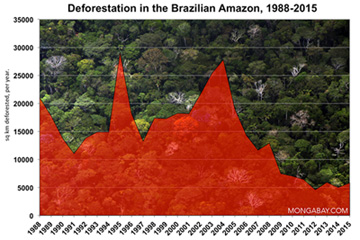Brazil calls out rich countries on global warming
Brazil calls out rich countries on global warming
mongabay.com
February 6, 2007
Reuters reports that Brazilian President Luiz Inacio Lula da Silva criticized wealthy countries for their contributions to global warming and told them to stay out of Brazil’s business when it comes to the fate of the Amazon rainforest.
“The wealthy countries are very smart, approving protocols, holding big speeches on the need to avoid deforestation but they already deforested everything,” Reuters quoted Lula as saying during the announcement of a public works project in Rio de Janeiro. “We need a different campaign, not only to protect plants and animals … to get rich countries to reduce gas emissions.”

DEFORESTATION IN BRAZIL: 60-70 percent of deforestation in the Amazon results from cattle ranches while the rest mostly results from small-scale subsistence agriculture. Logging results in forest degradation but rarely direct deforestation. However, studies have showed a close correlation between logging and future clearing for settlement and farming. |
Lula has aggressively stepped up conservation efforts of the world’s largest rainforest in recent years, setting aside more than 100 million hectares of the Amazon basin from development and cracking down on illegal activities. These efforts, combined with lower commodity prices may be paying off: forest loss for the 2005-2006 year was down more than 40 percent from the prior year. The 2005-2006 figure — 13,100 square kilometers (5,057 square miles) — is the lowest since 1991 when 11,130 square kilometers (4,258 square miles) of forest were lost.
Lula said Brazil is taking the lead on renewable engineering through pioneering work on sugar cane-based ethanol. Brazil is the largest producer of ethanol in the world.
“No country is revolutionizing its energy matrix as we are,” Lula said. “The so-called carbon credits they invented — so far, we haven’t seen a cent of that,” he said, referring to a proposal under which industrialized countries would be allowed to continue polluting in exchange for paying developing countries to conserve their forests and not develop polluting industries.
Brazil has long been suspicious of outside interest in the Amazon, fearing that “internationalization” of the rainforest would be a threat to its sovereignty.